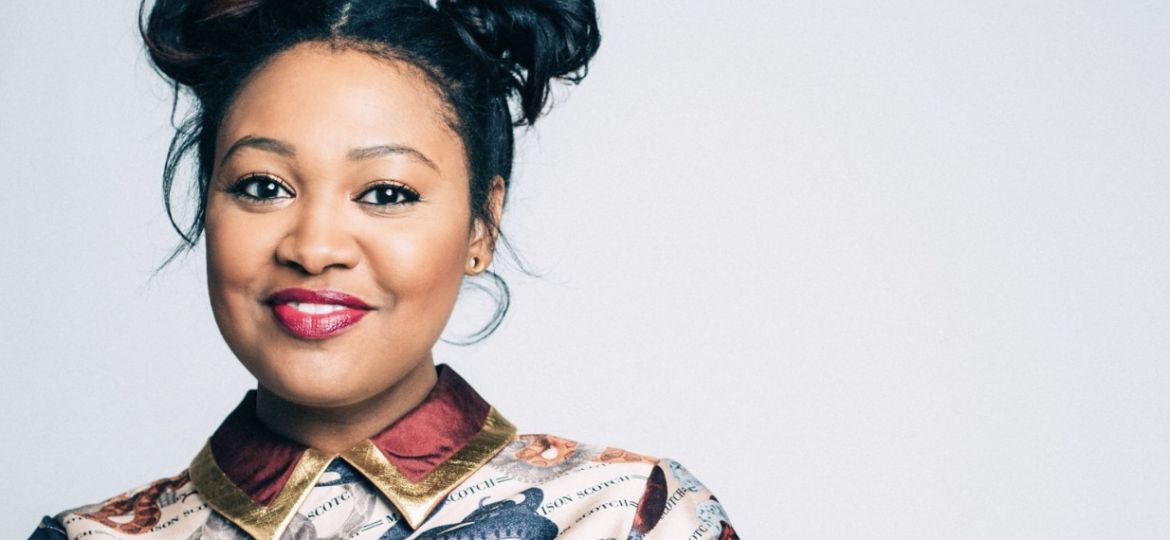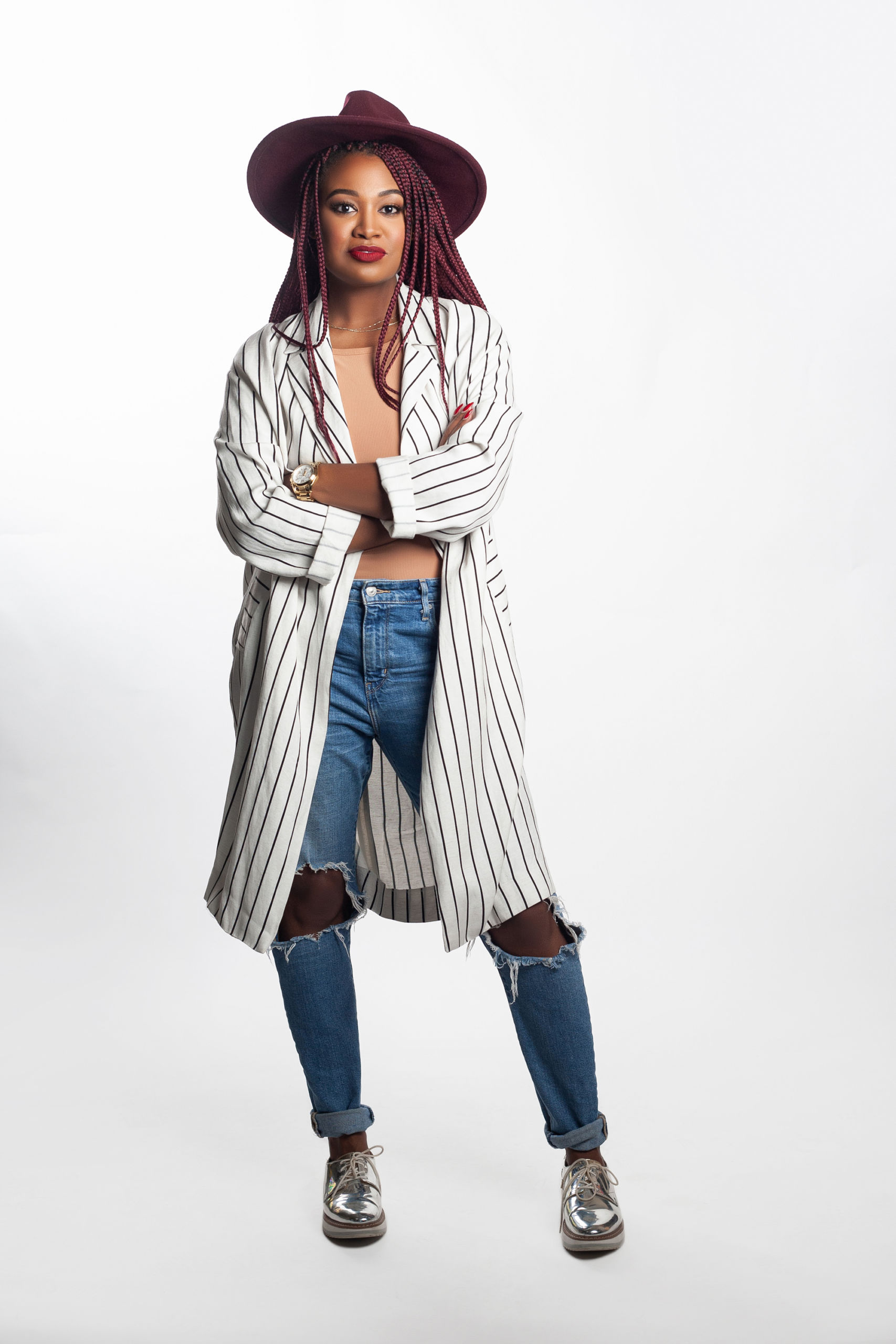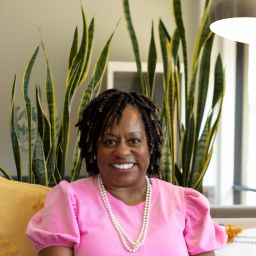
Exciting, scary, and constant. That’s the way Malina Simone, multifaceted maven and co-founder of Gang Gang—an arts and culture start-up created by Simone and her partner, Alan Bacon, described her day when we spoke just moments after the public launch of their latest endeavor. “This is what it’s been like for the past 100 days or so,” she said.
Following what has been a challenging and transformative year, many are wondering, where do we go from here and what will our world be like? While we each play a role in shaping our individual and collective future, creators and artists—those people who make our world more colorful, inviting, and interesting will help us to realize a new way. Gang Gang seeks to light the path forward.
 You guys launched today, what does it feel like to have your new baby out into the world?
You guys launched today, what does it feel like to have your new baby out into the world?
It is exciting that now it feels more real. The world has access to what we’ve been thinking about and strategizing for the last 120 days or so. For me personally, it’s a little anxiety causing because it’s out there and we have to deliver.
This all sounds incredibly exciting and I think because it is so new, it’ll be one of those things where some folks will have to stretch to understand. So in laymAn’s, non-artsy people terms, what is Gang Gang?
I’d say it’s a hybrid for-profit and non-profit organization that does two things. On one side, we inject, increase, and impact culture in cities so that those in the creative and cultural industries feel like they can make careers in their sector in that city. The second thing we do is invest directly in cultural opportunities.
So people like me who have been in the creative industry and had to make up all of my jobs and have had to go find funding from various sources in unique ways, there’s a place for them to find support and investment. Indianapolis has sort of figured out how to support artists who are practicing the traditional fine arts, but if you own a jewelry company, or a DJ school, or if you want to do whatever in the industry, there hasn’t been a place for you to find support—so that’s what this is doing.
Where did this come from? Were you guys just eating dinner together and someone said, Hey, let’s start a business?
Yeah, we were eating dinner (laughs). No, just joking. Actually, it was a Thursday night in June. I had just broken up with the job I’d had for two and a half years with Ambrose. If anyone has been close to the news, this time last year you saw the demise of Waterside. That was my other baby, the proposed redevelopment of the former GM stamping plant.
So for the first few months of this year, I was all about what am I going to do now? What is my role in this city? What is my role in maybe corporate America which is where I was? But my passion was, of course, arts and culture. So there’s that with me personally and then of course, there’s this pandemic and the murder of George Floyd and everything that it sparked at the time.
Alan and I were having conversations about what does this moment in time mean for everybody, for us, and for me the person without a job? So we began to think about how to revive and rebuild for the new world, a post-pandemic and post global civil rights movement world. And what we wanted that world to feel and look like and what we wanted our city to feel and look like in order for us to even stay here. We thought, in the new world, we don’t want Indianapolis, or any city, to go back to business as usual and rely only on their diversity, equity and inclusion plans and to hire more directors of community outreach—which is what I was being tapped for honestly in the summer.
People were having their first directors of diversity and I was being asked, can you contract with us for this? And just all the typical stuff you would expect out of a moment when people are talking about race. So we thought, that’s not gonna be enough anymore. It’s not what we want for our city. We want people to take it a step further and we kept coming back to the question of how do we revive the economy with equity in mind. How do we rebuild the economy in an equitable way? That’s culture. How do we revive the economy locally and bring visitors back? We would need to invest in the cultural sector because that’s why we’re losing so much talent.
Although we have amazing arts orgs, there is not a driver in the cultural scene. It was that night that we thought oh goodness, maybe that’s what we could do? We thought, what if we could leverage this moment and totally change the system and how it works by using culture which is the social driver but not the economic leader?
View this post on Instagram
View this post on Instagram
I want to backtrack a little bit to what you said about the job offers coming your way to join an org doing community outreach. What was it like for you to decide not to take one of those jobs and instead take a chance on yourself and your partner?
It was frightening and intentional on my part. I felt like I was being pulled in both directions. On one hand, my partner and I are in a house downtown. There are five children between us and two of them are in private school.
Well, damn!
Yeah (laughs), my girls are in their 7th and 8th grade year at a very prestigious, very expensive private school and so for that reason and many others I have to have income and a sense of stability for those around me.
On the other hand, this was also just a very important moment in my life and career. I am in my late 30s and I now have this opportunity where a door has closed and I have the option as to what door I’ll open next. I’m not interested in thinking about the job aspect of my day-to-day. How long am I gonna be here? Will I get let go again? Just having to rely on someone else for my day to day work.
This is an opportunity to go all in and do something that I enjoy and can control. Maybe that’s a better way to set up stability for me and my family and a way to show my girls that when you’re at a crossroads in your career you can choose what society needs and what you think your life needs and what you think your career needs in that moment. Maybe the answer is very scary but it makes it all the more worthwhile to press into.
You’ve had a hell of a 2020. In addition to your career transition, you’ve been open about your personal experience with contracting COVID-19 and being what is called a ‘long-hauler.’ What does work look like for you in light of all that?
I’m trying to figure out how to put two words together, which are: motivated and overwhelmed. Which is a strange dichotomy and I’m living right there at the intersection.
Just from an intangible perspective, in the world there’s a lot going on. As a person who feels everything, I need time to be quiet and process and I don’t feel like I’ve gotten that as everything is fast, constant and changing. The reason I’m able to keep up with it is because of this new purpose. I feel like this business is mine, it was made for me and given to me. It’s the driving force and probably what’s keeping me healthy and somewhat sane and grounded.
You have attracted the attention of some heavy-hitters, like CICF and Newfields. What was it like sitting down with them and saying “Hey, we’re gonna take your money and do this with it.” Was it a hard sell or did they just say, “We’ll do whatever Mali and Alan tell us to do?”
I would like to think it was the latter and, honestly, the conversation was probably scarier on our end because we’re going into these meetings making some very bold claims. We’re saying: America has shaped itself off the power and passion of Black culture and now it’s time to pay the culture back. And we don’t know how they’re going to respond. But, for the most part, everyone gets it and it’s very interesting. We wonder if they are getting it because we just introduced it or are they into it because of the moment 2020 is in.
Does that matter to you all?
It matters, but not when it comes to fundraising. It matters on a theoretical and philosophical perspective because it’s revealing more conversations that need to be had.
As it relates to fundraising, we’re leveraging this moment like everyone else is. People are wanting to support more efforts around equity and race and we’re saying, we have a solution that is Black-led that goes directly to the people you want to support. Please give us your dollars and we’re going to put it where you should’ve been putting it all along. Some of them know that and acknowledge it. For example, three days after our pitch with CICF, they offered to incubate us and said it was a path toward equity as we have the same mission in mind. We have been thankful for the support seen thus far.
We’ve also talked about how this moment will pass. We know that this is a larger movement and this has been the case since day one. Contributions from creators of color have been stolen from day one and it’s not going to stop later. It’s not to take away from the support we have right now but to say I hope it’s still there in five years.
Back to your point about those bold claims. The imagery of your business and the name alone, Gang Gang, feels Black as hell. Why go that way and not do something that would be more palatable and middle of the road?
We actually heard from two potential funders that the name would not get us money. That it was a barrier. Other names were suggested like The Center for such and such or the Whatever for Equity and things that, that were not as grabbing.
We went for a name that was bold and had depth for two reasons. One, we want the people we’re supporting to know we’re here for them. We created this organization to support folks who we refer to as “people of culture”. We saw that when we launched and put the name out there, “people of culture” gravitated quickly because it’s obviously for them.
On the other side of things, because we are word people, we dug into the meaning of gang. After that initial Thursday night this summer, the brainstorming hasn’t stopped. Alan said “gang, gang” out loud and I thought, oh my goodness let’s look into it. What’s the meaning of gang? The original meaning was journey, it was like a way. You know… someplace to go. Then it was a set of things or people that go someplace together. And then in the middle of the 19th century, criminal groups started to arise in America—the Italian mafia, Russian mafia, and then somewhere along the way, the word gang started being used to criminalize groups of Black men. And so we thought, let’s reclaim the word.
It means a group of people going on a journey together and that’s exactly what we’re doing so that’s what we’ll call it. So we took back the meaning of the word which is the ethos of the whole business. All of us in the cultural space have these visions and ideas and we’re already contributing so much so let’s go get the money for it.
You mentioned, “People of Culture” gravitated quickly and got it. I want to go back in time to some of the things you already did this summer. You had the Black Lives Matter mural on Indiana Avenue and an art gallery afterwards that featured the 18 artists involved. It’s even been covered in Forbes. But, there was some backlash in the community around it all. Have you received any of those challenging responses around this effort and are you at all concerned?
It has been fairly quiet and there haven’t been a lot of opportunities for feedback. We’ve had small group meetings with funders and there’s dissonance and acceptance there but on a community level when we talk about it for the most part it’s positively received.
We did our pitch for a group of local influencers and asked for their feedback. Overwhelmingly, almost to my surprise, because I do have trauma from the summer, it was so, so positive. That was not only a relief but also confirmation that Indianapolis needs this and “people of culture” need this. I am concerned, Alan not so much, about backlash and people not thinking it’s helpful for the community.
When you’re doing stuff in the world of race, it’s sensitive and rightly so because of the history and emotion involved. I’ve always welcomed that dialogue. I love questions and ideas so if people have constructive criticism… we’re open books and open calendars. We accept it all.
I imagine that those calendars won’t stay open for long as things progress and more people want to get involved. What can we look forward to next?
Right now, we have a small-scale winter placemaking series coming up with 10 East Arts. There’s an old garage that’s been refurbished on 10th Street and they were looking for some activation of that space.
We have six shows, mainly artists of color, and it’s an outdoor Wednesday night live music series. This is a taste of what’s to come. Lo-fi but high impact. For 2021, I think it’ll look like a mix of things including announcing partnerships with some large institutions as we find creative ways to solve our strategies for being a more equitable and inclusive city. We’ll also have our own internally-led events and programs and I think I’m most excited about that because it’s my world and I can have whatever I dream up. And then, third, this will take longer as we continue to raise funds, but we’ll be making investments into cultural start-ups and cultural businesses right here in Indianapolis.
A lot of people are looking for 2021 to be a new start. Something about a new calendar year is motivational after what we’ve all experienced. What role does art and culture play in the new world?
Arts and culture, as it always has, plays a pivotal role. The mural was an example of how those words were telling the story of the moment and of the movement. Arts and culture will do the same thing next year. It’ll tell the story of where we’ve been, help to process where we are and help us to heal from everything we’ve experienced.
Ebony Marie Chappel is a freelance writer in Indianapolis and an Indy Maven contributor.







